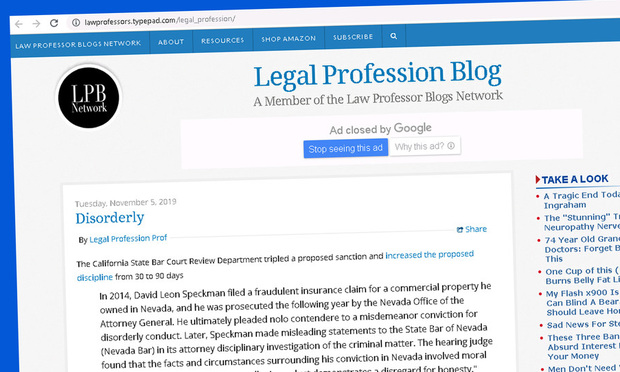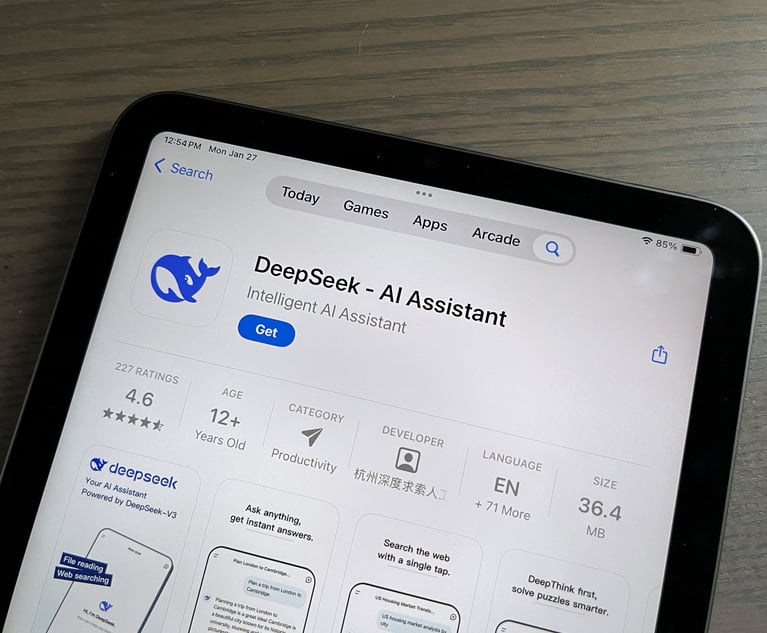Attorney-Discipline Blogger Is Target of Defamation Suit
Attorney John Paul Szymkowicz has sued blogger Michael Frisch for defamation over a series of posts on the Legal Profession Blog, which tracks attorney discipline cases across the country.
November 05, 2019 at 06:00 PM
4 minute read
 Screenshot of Legal Profession Blog.
Screenshot of Legal Profession Blog.
A lawyer who writes a popular blog about attorney discipline was sued for defamation Tuesday by an attorney featured in a series of critical blog posts.
The lawsuit was filed against Michael Frisch, adjunct professor and ethics counsel at Georgetown University Law Center, who is also the primary author of the Legal Profession Blog, which highlights attorney discipline cases across the country. The plaintiff in the suit brought in the U.S. District Court for the District of Columbia is attorney John Paul Szymkowicz, who also named Law Professor Blogs LLC, a blogging network owned by Paul Caron, dean of Pepperdine University Rick J. Caruso School of Law. Frisch's Legal Profession Blog is a member of Law Professor Blogs.
The complaint alleges that Frisch published a series of blog posts between 2012 and 2018 that "engaged in false, defamatory, public, and vile personal attacks against J.P. Szymkowicz, culminating in their most recent accusations of legal misconduct, 'elder care abuse,' and 'horrific elder abuse.'"
Reached Tuesday, Frisch said he had not been served with the lawsuit and declined to comment. Caron did not immediately respond to requests for comment Tuesday, nor did attorney John B. Williams of Washington, D.C., firm Williams Lopatto, who is representing Szymkowicz.
The allegedly defamatory blog posts focused on a lengthy ethics case that was launched against Szymkowicz and his father, also a lawyer, in the District of Columbia that centered on their role in litigation involving four members of a feuding family and the fate of a revocable trust. One member of the family filed complaints with the District of Columbia Office of Disciplinary Counsel in 2005 and 2007 claiming that the Szymkowicz men had conflicts of interest in the case because they represented both the mother and the son in the proceedings.
Disciplinary Counsel Julia Porter—who the plaintiff claims is friends with Frisch, himself a former assistant bar counsel in the District of Columbia—asserted charges of conflict of interest and dishonesty against the Szymkowiczes. Following hearings in 2009 and 2010, the Hearing Committee of the Board on Professional Responsibility recommended dismissal of all the charges, and the District of Columbia Board on Professional Responsibility followed that recommendation in 2014.
In 2015, the District of Columbia Court of Appeals dismissed the dishonesty charges against the Szymkowiczes but tasked the Board on Professional Responsibility to reconsider the conflict of interest charges due to the fact that the duo had jointly represented two of the parties, and it was unclear whether they had obtained informed consent to the joint representation.
But the board in 2017 concluded that Porter had never proven that the Szymkowiczes failed to obtain that informed consent and the following year the appeals court dismissed all remaining charges against the lawyer duo.
Throughout the proceedings, Frisch wrote a series of posts critical of the Szymkowiczes' conduct and the Board on Professional Responsibilities' handling of the case. The first post, in 2012, was titled, "The Worst Hearing Committee Report in D.C. History," the complaint notes. The last post ran in 2018 after all charges against the Szymkowiczes were dismissed, and was titled, "District of Columbia Court Absolves Attorneys of Horrific Elder Abuse Conflict."
"I find this shocking, but at least it makes the agenda of this report crystal clear: protect the profession, trash the victim of misconduct (and discourage other victims from coming forward), make future Bar Counsel prosecutions virtually impossible and use the whole thing as a marketing tool," Frisch wrote.
The complaint alleges that Frisch falsely accused the plaintiff of elder abuse, among other things.
"Defendants continued to falsely accuse the Szymkowiczes of misconduct and elder abuse despite their knowledge that the disciplinary charges had been rejected by every tribunal to consider them," it reads.
Szymkowicz had brought claims of defamation, invasion of privacy, and intentional affliction of emotional distress.
This content has been archived. It is available through our partners, LexisNexis® and Bloomberg Law.
To view this content, please continue to their sites.
Not a Lexis Subscriber?
Subscribe Now
Not a Bloomberg Law Subscriber?
Subscribe Now
NOT FOR REPRINT
© 2025 ALM Global, LLC, All Rights Reserved. Request academic re-use from www.copyright.com. All other uses, submit a request to [email protected]. For more information visit Asset & Logo Licensing.
You Might Like
View All
Eighth Circuit Determines No Standing for Website User Concerned With Privacy Who Challenged Session-Replay Technology
7 minute read
The Time Is Now for Employers to Assess Risk of Employees’ Use of DeepSeek
4 minute read
Fired by Trump, EEOC's First Blind GC Lands at Nonprofit Targeting Abuses of Power
3 minute read
Houston Law Firm Files $250K Breach of Contract Suit Against 2 Former Lawyers
3 minute readTrending Stories
- 1Carol-Lisa Phillips to Rise to Broward Chief Judge as Jack Tuter Weighs Next Move
- 2Data Breaches in UK Legal Sector Surge, According to ICO Data
- 3Georgia Law Schools Seeing 24% More Applicants This Year
- 4After Shutting USAID, Trump Eyes Department of Education, CFPB
- 5‘Keep Men Out’: Female Swimmers Sue Ivy Leagues Over Lia Thomas’ Sweep
Who Got The Work
J. Brugh Lower of Gibbons has entered an appearance for industrial equipment supplier Devco Corporation in a pending trademark infringement lawsuit. The suit, accusing the defendant of selling knock-off Graco products, was filed Dec. 18 in New Jersey District Court by Rivkin Radler on behalf of Graco Inc. and Graco Minnesota. The case, assigned to U.S. District Judge Zahid N. Quraishi, is 3:24-cv-11294, Graco Inc. et al v. Devco Corporation.
Who Got The Work
Rebecca Maller-Stein and Kent A. Yalowitz of Arnold & Porter Kaye Scholer have entered their appearances for Hanaco Venture Capital and its executives, Lior Prosor and David Frankel, in a pending securities lawsuit. The action, filed on Dec. 24 in New York Southern District Court by Zell, Aron & Co. on behalf of Goldeneye Advisors, accuses the defendants of negligently and fraudulently managing the plaintiff's $1 million investment. The case, assigned to U.S. District Judge Vernon S. Broderick, is 1:24-cv-09918, Goldeneye Advisors, LLC v. Hanaco Venture Capital, Ltd. et al.
Who Got The Work
Attorneys from A&O Shearman has stepped in as defense counsel for Toronto-Dominion Bank and other defendants in a pending securities class action. The suit, filed Dec. 11 in New York Southern District Court by Bleichmar Fonti & Auld, accuses the defendants of concealing the bank's 'pervasive' deficiencies in regards to its compliance with the Bank Secrecy Act and the quality of its anti-money laundering controls. The case, assigned to U.S. District Judge Arun Subramanian, is 1:24-cv-09445, Gonzalez v. The Toronto-Dominion Bank et al.
Who Got The Work
Crown Castle International, a Pennsylvania company providing shared communications infrastructure, has turned to Luke D. Wolf of Gordon Rees Scully Mansukhani to fend off a pending breach-of-contract lawsuit. The court action, filed Nov. 25 in Michigan Eastern District Court by Hooper Hathaway PC on behalf of The Town Residences LLC, accuses Crown Castle of failing to transfer approximately $30,000 in utility payments from T-Mobile in breach of a roof-top lease and assignment agreement. The case, assigned to U.S. District Judge Susan K. Declercq, is 2:24-cv-13131, The Town Residences LLC v. T-Mobile US, Inc. et al.
Who Got The Work
Wilfred P. Coronato and Daniel M. Schwartz of McCarter & English have stepped in as defense counsel to Electrolux Home Products Inc. in a pending product liability lawsuit. The court action, filed Nov. 26 in New York Eastern District Court by Poulos Lopiccolo PC and Nagel Rice LLP on behalf of David Stern, alleges that the defendant's refrigerators’ drawers and shelving repeatedly break and fall apart within months after purchase. The case, assigned to U.S. District Judge Joan M. Azrack, is 2:24-cv-08204, Stern v. Electrolux Home Products, Inc.
Featured Firms
Law Offices of Gary Martin Hays & Associates, P.C.
(470) 294-1674
Law Offices of Mark E. Salomone
(857) 444-6468
Smith & Hassler
(713) 739-1250








